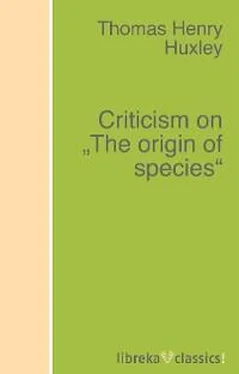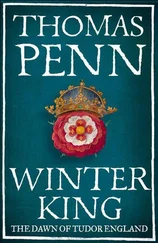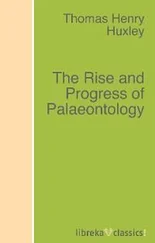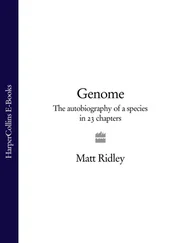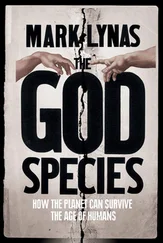Thomas Henry Huxley - Criticism on The origin of species
Здесь есть возможность читать онлайн «Thomas Henry Huxley - Criticism on The origin of species» — ознакомительный отрывок электронной книги совершенно бесплатно, а после прочтения отрывка купить полную версию. В некоторых случаях можно слушать аудио, скачать через торрент в формате fb2 и присутствует краткое содержание. Жанр: unrecognised, на английском языке. Описание произведения, (предисловие) а так же отзывы посетителей доступны на портале библиотеки ЛибКат.
- Название:Criticism on The origin of species
- Автор:
- Жанр:
- Год:неизвестен
- ISBN:нет данных
- Рейтинг книги:3 / 5. Голосов: 1
-
Избранное:Добавить в избранное
- Отзывы:
-
Ваша оценка:
- 60
- 1
- 2
- 3
- 4
- 5
Criticism on The origin of species: краткое содержание, описание и аннотация
Предлагаем к чтению аннотацию, описание, краткое содержание или предисловие (зависит от того, что написал сам автор книги «Criticism on The origin of species»). Если вы не нашли необходимую информацию о книге — напишите в комментариях, мы постараемся отыскать её.
Criticism on The origin of species — читать онлайн ознакомительный отрывок
Ниже представлен текст книги, разбитый по страницам. Система сохранения места последней прочитанной страницы, позволяет с удобством читать онлайн бесплатно книгу «Criticism on The origin of species», без необходимости каждый раз заново искать на чём Вы остановились. Поставьте закладку, и сможете в любой момент перейти на страницу, на которой закончили чтение.
Интервал:
Закладка:
Titel: Criticism on "The origin of species"
von ca. 337-422 Faxian, Sir Samuel White Baker, Sax Rohmer, Bernardin de Saint-Pierre, Maria Edgeworth, Saint Sir Thomas More, Herodotus, L. Mühlbach, Herbert Allen Giles, G. K. Chesterton, Algernon Charles Swinburne, Rudyard Kipling, A. J. O'Reilly, William Bray, O. Henry, graf Leo Tolstoy, Anonymous, Lewis Wallace, Johann Wolfgang von Goethe, Edgar Allan Poe, Jack London, Elizabeth Cleghorn Gaskell, Jules Verne, Frank Frankfort Moore, Susan Fenimore Cooper, Anthony Trollope, Henry James, T. Smollett, Thomas Burke, Emma Goldman, George Eliot, Henry Rider Haggard, Baron Thomas Babington Macaulay Macaulay, A. Maynard Barbour, Edmund Burke, Gerold K. Rohner, Bernard Shaw, Sir Joshua Reynolds, Bret Harte, Nathaniel Hawthorne, Jerome K. Jerome, Isabella L. Bird, Christoph Martin Wieland, Rainer Maria Rilke, Ludwig Anzengruber, Freiherr von Ludwig Achim Arnim, G. Harvey Ralphson, John Galsworthy, George Sand, Pierre Loti, Fyodor Dostoyevsky, Giambattista Basile, Homer, John Webster, P. G. Wodehouse, William Shakespeare, Edward Payson Roe, Sir Walter Raleigh, Victor [pseud.] Appleton, Arnold Bennett, James Fenimore Cooper, James Hogg, Richard Harding Davis, Ernest Thompson Seton, William MacLeod Raine, E. Phillips Oppenheim, Maksim Gorky, Henrik Ibsen, George MacDonald, Sir Max Beerbohm, Lucy Larcom, Various, Sir Robert S. Ball, Charles Darwin, Charles Reade, Adelaide Anne Procter, Joseph Conrad, Joel Chandler Harris, Joseph Crosby Lincoln, Alexander Whyte, Kate Douglas Smith Wiggin, James Lane Allen, Richard Jefferies, Honoré de Balzac, Wilhelm Busch, General Robert Edward Lee, Charles Dickens, Wilkie Collins, David Cory, Booth Tarkington, George Rawlinson, Sir Arthur Conan Doyle, Dinah Maria Mulock Craik, Christopher Evans, Thomas Henry Huxley, Mary Roberts Rinehart, Erskine Childers, Alice Freeman Palmer, Florence Converse, William Congreve, Stephen Crane, Madame de La Fayette, United States. Army. Corps of Engineers. Manhattan District, Willa Sibert Cather, Anna Katharine Green, Oliver Wendell Holmes, Charlotte M. Brame, Alphonse Daudet, Booker T. Washington, Clemens Brentano, Sylvester Mowry, Geoffrey Chaucer, Ellen Anderson Gholson Glasgow, Gail Hamilton, William Roscoe Thayer, Margaret Wade Campbell Deland, Rafael Sabatini, Archibald Henderson, Albert Payson Terhune, George Wharton James, Padraic Colum, James MacCaffrey, John Albert Macy, Annie Sullivan, Helen Keller, Walter Pater, Sir Richard Francis Burton, Baron de Jean-Baptiste-Antoine-Marcelin Marbot, Aristotle, Gustave Flaubert, 12th cent. de Troyes Chrétien, Valentine Williams, Thomas Wentworth Higginson, Alexandre Dumas fils, John Gay, Andrew Lang, Hester Lynch Piozzi, Jeffery Farnol, Alexander Pope, George Henry Borrow, Mark Twain, Francis Bacon, Margaret Pollock Sherwood, Henry Walter Bates, Thornton W. Burgess, Edmund G. Ross, William Alexander Linn, Voltaire, Giles Lytton Strachey, Henry Ossian Flipper, Émile Gaboriau, Arthur B. Reeve, Hugh Latimer, Baron Edward Bulwer Lytton Lytton, Benito Pérez Galdós, Robert Smythe Hichens, Niccolò Machiavelli, Prosper Mérimée, Ivan Sergeevich Turgenev, Anatole Cerfberr, Jules François Christophe, Victor Cherbuliez, Edgar B. P. Darlington, David Grayson, Mihai Nadin, Helen Beecher Long, Plutarch, Harriet Beecher Stowe, Margaret E. Sangster, Herman Melville, John Keats, Fannie Isabel Sherrick, Maurice Baring, William Terence Kane, Mary Russell Mitford, Henry Drummond, Rabindranath Tagore, Hubert Howe Bancroft, Charlotte Mary Yonge, William Dean Howells, Jesse F. Bone, Basil Hall Chamberlain, William Makepeace Thackeray, Samuel Butler, Frances Hodgson Burnett, E. Prentiss, Sir Walter Scott, Alexander K. McClure, David Livingstone, Bram Stoker, Victor Hugo, Patañjali, Amelia Ruth Gere Mason, Bertrand Russell, Alfred Russel Wallace, Molière, Robert Louis Stevenson, Simona Sumanaru, Michael Hart, Edmund Gosse, Samuel Smiles, Pierre Corneille, Clarence Edward Mulford, Mrs. Oliphant, George Pope Morris, Aristophanes, baron de Etienne-Léon Lamothe-Langon, William Morris, Henry David Thoreau, E. C. Bentley, Samuel Taylor Coleridge, Hippolyte Taine, Pedro Calderón de la Barca, John Philip Sousa, Wilhelm Grimm, Jacob Grimm, William Gardner, J. M. Judy, E. M. Forster, Percival Lowell, Alexandre Dumas père, William Greenwood, John Dryden, William T. Sherman, John Kendrick Bangs, Burton Egbert Stevenson, Eugene Wood, John Arbuthnot, Sir Richard Steele, Sir George Otto Trevelyan, William Charles Henry Wood, Marcel Proust, Philip Henry Sheridan, Abraham Lincoln, John Pinkerton, Thomas Hardy, Gotthold Ephraim Lessing, Oliver Goldsmith, Freiherr von der Friedrich Trenck, Eugene Field, Charles Dudley Warner, Andrew Everett Durham, Emily Dickinson, Emperor of Rome Marcus Aurelius, Edgar Wallace, Annie Roe Carr, Eleanor Stackhouse Atkinson, George McKinnon Wrong, Heinrich Zschokke, Harold Howland, Grace S. Richmond, Louisa May Alcott, Thomas Edwards, William Kirby, John McElroy, Margaret Sidney, Ford Madox Ford, Clara Louise Burnham, Karl Friedrich May, Friedrich Schiller, Baroness Emmuska Orczy Orczy, Margaret Penrose, Joseph Addison, Silvio Pellico, Alfred Ollivant, Irving Bacheller, James Harrington, Helen Hunt Jackson, Abraham Cahan, G. A. Henty, Mary Johnston, Marcus Tullius Cicero, Hamlin Garland, George Washington Plunkitt, the Younger Pliny, James Joyce, Henry Adams, Tommaso Campanella, Marshall Saunders, Don Manoel Gonzales, Friedrich Heinrich Karl Freiherr de La Motte-Fouqué, Saki, Oscar Douglas Skelton, Nathaniel W. Stephenson, João Simões Lopes Neto, Heinrich Heine, Flavius Josephus, Henryk Sienkiewicz, Melville Davisson Post, Howard Pyle, William Harrison Ainsworth, Fergus Hume, John Lydgate, Robert Browning, Louis Ginzberg, Carolyn Wells, Jean-Henri Fabre, Christian Friedrich Hebbel, Frederic William Moorman, Hugo Ball, James Stephens, Khristo Botev, Franklin Hichborn, Walter Lynwood Fleming, Solon J. Buck, Holland Thompson
ISBN 978-3-7429-2825-2
Alle Rechte vorbehalten.
Es ist ohne vorherige schriftliche Erlaubnis nicht gestattet, dieses Werk im Ganzen oder in Teilen zu vervielfältigen oder zu veröffentlichen.
CRITICISMS ON
"THE ORIGIN OF SPECIES"
'The Natural History Review', 1864
[1]
By Thomas H. Huxley
In the course of the present year several foreign commentaries upon Mr. Darwin's great work have made their appearance. Those who have perused that remarkable chapter of the 'Antiquity of Man,' in which Sir Charles Lyell draws a parallel between the development of species and that of languages, will be glad to hear that one of the most eminent philologers of Germany, Professor Schleicher, has, independently, published a most instructive and philosophical pamphlet (an excellent notice of which is to be found in the 'Reader', for February 27th of this year) supporting similar views with all the weight of his special knowledge and established authority as a linguist. Professor Haeckel, to whom Schleicher addresses himself, previously took occasion, in his splendid monograph on the 'Radiolaria' 2, to express his high appreciation of, and general concordance with, Mr. Darwin's views.
But the most elaborate criticisms of the 'Origin of Species' which have appeared are two works of very widely different merit, the one by Professor Kolliker, the well-known anatomist and histologist of Wurzburg; the other by M. Flourens, Perpetual Secretary of the French Academy of Sciences.
Professor Kolliker's critical essay 'Upon the Darwinian Theory' is, like all that proceeds from the pen of that thoughtful and accomplished writer, worthy of the most careful consideration. It comprises a brief but clear sketch of Darwin's views, followed by an enumeration of the leading difficulties in the way of their acceptance; difficulties which would appear to be insurmountable to Professor Kolliker, inasmuch as he proposes to replace Mr. Darwin's Theory by one which he terms the 'Theory of Heterogeneous Generation.' We shall proceed to consider first the destructive, and secondly, the constructive portion of the essay.
Читать дальшеИнтервал:
Закладка:
Похожие книги на «Criticism on The origin of species»
Представляем Вашему вниманию похожие книги на «Criticism on The origin of species» списком для выбора. Мы отобрали схожую по названию и смыслу литературу в надежде предоставить читателям больше вариантов отыскать новые, интересные, ещё непрочитанные произведения.
Обсуждение, отзывы о книге «Criticism on The origin of species» и просто собственные мнения читателей. Оставьте ваши комментарии, напишите, что Вы думаете о произведении, его смысле или главных героях. Укажите что конкретно понравилось, а что нет, и почему Вы так считаете.
